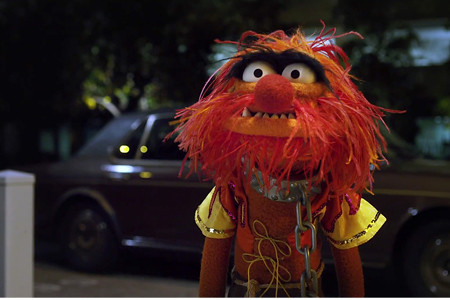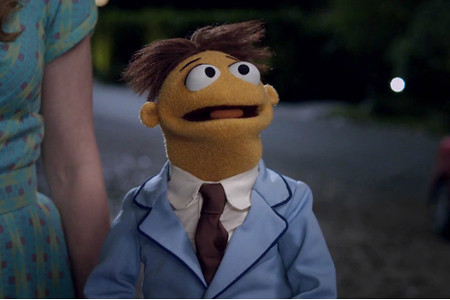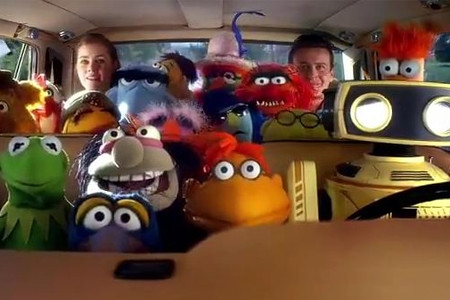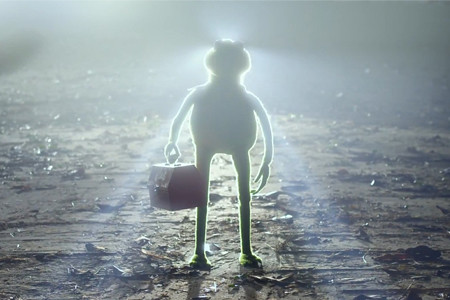The Geekscape Review: The Muppets
So at this point I think we can pretty much all agree that the Muppets are the single most amazing invention ever crafted or conceived in the entire history of human achievement, as evidenced by the recent enthusiasm for them all over my Facebook feed.
That doesn’t erase the fact, however, that this latest, gigantic comeback extravaganza in the Muppet franchise is being released by Disney, and even though they did a really good job on Muppet Christmas Carol and probably didn’t totally fuck up Muppet Treasure Island or Muppets From Space from what I can vaguely remember about those two movies, big gala franchise revivals like The Muppets always have the potential to go disastrously awry, especially when you’re talking about a property with such mouth-wateringly built-in potential for a vast, soul-destroying merchandizing campaign aimed simultaneously at wide-eyed, stupid young children and downtrodden young adults attempting to recapture the innocent nostalgia of their youth before they had to spend every single night laying awake in bed, staring at that crack in the ceiling and wondering how they’re ever going to pay back their student loans. Fortunately for everyone, The Muppets doesn’t merely succeed at not being a soul-sucking waste of time — it’s a funny, brilliant, and highly engaging musical comedy, and probably one of the greatest Muppet movies ever made.

At a superficial level, The Muppets is a fun and entertaining movie with a good soundtrack and just the right combination of genuine sparkle and hat-tipping self-acknowledgement to create and sustain an instant, deep rapport with its audience. What’s really impressive, though, is that it manages to consistently balance such a sterling degree of showmanship with a thematic undercurrent that’s genuinely moving and complex. The protagonists of the movie are Walter and Gary, a pair of brothers who grew up obsessed with The Muppet Show, and who are now futilely attempting, in their respective ways to transition into adulthood. Walter is a Muppet-like, but essentially non-Muppet character, and Gary is Jason Segel, whose relationship with his girlfriend, Mary (Amy Adams) is becoming strained by his failure to commit. To celebrate the tenth anniversary of their relationship, Gary and Mary decide to take a special vacation trip to Hollywood, but at the last minute Gary invites Walter along, too, so that the brothers can fulfill their childhood dream of touring Muppet Studios together. Mary is clearly disappointed, but she obligingly doesn’t protest.

Arriving in Hollywood, Walter is disappointed to find the Muppet Studios dilapidated and virtually abandoned — it’s been twenty-odd years since The Muppet Show went off the air, and the troupe’s star has clearly faded. After sneaking into Kermit’s former office, however, Walter’s disappointment turns to shock when he overhears a skeevy oil tycoon (Chris Cooper) negotiating a deal with Statler and Waldorf to purchase the Muppet Studios in order to raze the historic sets and drill for oil. Determined to rescue the relics of his childhood fantasies fro destruction, Walter convinces Gary and Mary to help him locate Kermit the Frog and the rest of the Muppet cast, hoping to salvage the Studios — and possibly the Muppets’ waylaid entertainment careers — by staging an emergency fundraiser event live on National television.

The plot of The Muppets is a familiar mainstay of ’80s teen comedies, and that’s part of the point, since a central motif of The Muppets is ’80s youth nostalgia, with the Muppets standing in as a particularly poignant signifier. However, as the pastel costumes, jaunty ensemble dance choreography, and weird, terrifying, five-second Mickey Rooney cameo in the opening number testify, the movie isn’t just interested in the ’80s, but in pretty much the entire tradition of theatrical and variety show entertainment that spawned the Muppets to begin with. That’s why the “let’s put on a show” trope is such a great story choice — it’s actually a cliche that dates all the way back to the germination of the musical genre in the 1930s, just like the parallel “rise to fame” plot that drove bothThe Muppet Movie and The Muppets Take Manhattan.
Defending the validity of popular entertainment is pretty much the thematic core of The Muppets, and it does an awesome job. Aside from celebrating the musical comedy format with deftness and aplomb, it also uses the Gary and Walter subplot to explore what popular entertainment means to individual people, and to stress the deep interconnection between performers and their audience. The whole film is swathed in an intricate network of subtle, overlapping references to the original Muppet TV series and previous Muppet films,and even though there are a couple of heavy-handed jokes in there about how silly it is that it used to be 1985 and now it’s not anymore (Kermit’s Rocky IV robot butler was my personal favorite), the few scenes that threaten initially to devolve into self-lampooning irony recover themselves quickly.

The dramatic need for the Muppets to stage an adversity-laden comeback is, more than anything, the crux of the film’s humor — it may have been awhile since their last red carpet, but the Muppets have clearly never left the public consciousness, and their legacy is as secure as it ever has been. The Muppets reaffirms that legacy with a degree of style, wit, and eloquence well-befitting its subjects.
